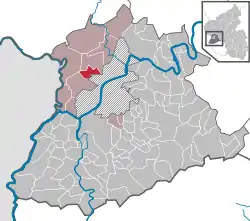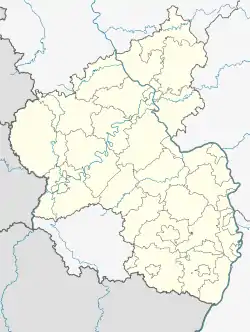Aach, Rhineland-Palatinate
Aach (German: [aːx] (![]() listen)) is a municipality in the German state of Rhineland-Palatinate. It is part of Trier-Land, a Verbandsgemeinde.
listen)) is a municipality in the German state of Rhineland-Palatinate. It is part of Trier-Land, a Verbandsgemeinde.
Aach | |
|---|---|
 | |
 Coat of arms | |
Location of Aach within Trier-Saarburg district  | |
 Aach  Aach | |
| Coordinates: 49°47′28″N 06°35′24″E | |
| Country | Germany |
| State | Rhineland-Palatinate |
| District | Trier-Saarburg |
| Municipal assoc. | Trier-Land |
| Subdivisions | 3 |
| Government | |
| • Mayor | Claudia Thielen |
| Area | |
| • Total | 6.96 km2 (2.69 sq mi) |
| Elevation | 271 m (889 ft) |
| Population (2019-12-31)[1] | |
| • Total | 1,086 |
| • Density | 160/km2 (400/sq mi) |
| Time zone | UTC+01:00 (CET) |
| • Summer (DST) | UTC+02:00 (CEST) |
| Postal codes | 54298 |
| Dialling codes | 0651 |
| Vehicle registration | TR |
| Website | www.gemeinde-aach.de |
History
The settlement of Aach dates to the Bronze Age. Later there also was a settlement of the Roman Empire. The current municipality was first mentioned in the year 953 under its Latin name Aquacuum. Despite being situated so close to the city of Trier, it was not part of the Archbishopric of Trier. Belonging to the Benedictine monastery St. Irminen, it was reichsfrei. This prompted many Jews to settle in Aach after they were expelled from Trier in the 16th century.
During the time of the Napoleonic Wars Aach was—according to the Treaty of Lunéville 1802—a part of France. After Napoleon's ultimate defeat in 1815 Aach became a part of the new Prussian Rhineland province. Prussia itself became a part of the German Empire in 1871.
After World War II Aach became a part of the new (West) German state of Rhineland-Palatinate.
Aach is known for its "Viez", the typical hard cider of the region.
Law and government
Aach has a council with sixteen seats. The elections in 2004 brought the CDU twelve seats, the other four went to the free voters' association FWG Aach e. V. In the same elections Mayor Josef Krein (CDU) was voted into office with nearly 74% of the votes. The last elections in 2009 brought the Christian Democrats all sixteen seats. Ralf Kierspel (CDU) was voted with 92,72% as mayor.
Geography
Aach lies about 6 km north of the center of Trier. It is situated in the southern Eifel mountains. Hohensonne is a village located just to the west and is included in the municipality.
Aach can be reached via Autobahn A 64 (connecting Trier and Luxembourg) at exit no. 3 about 3.7 km south of Aach. The next railway station is the central station of Trier.
Jewish History
Jews first settled in Aach in 1589. Their population peaked at 86 in 1850. Most Jews were cattle traders, and were fairly successful. The town's synagogue was inaugurated in 1860. In 1938, the majority of Aach's Jews emigrated. Many who remained, perished in the Holocaust. There is no longer an organized Jewish community in Aach. However, the synagogue and Jewish cemetery (dating back to 1600) still exist.[2][3]
References
- "Bevölkerungsstand 2019, Kreise, Gemeinden, Verbandsgemeinden". Statistisches Landesamt Rheinland-Pfalz (in German). 2020.
- Spector, Shmuel; Wigoder, Geoffrey (2001). The Encyclopedia of Jewish Life Before and During the Holocaust. Volume I. NYU Press. p. 17. ISBN 978-0814793763.
- "Aach". Destroyed German Synagogues And Communities. Synagogue Memorial "Beit Ashkenaz". Retrieved 17 February 2020.